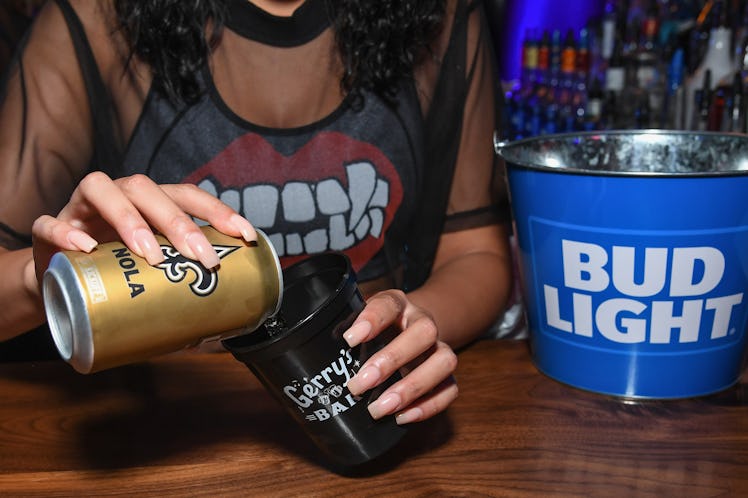
A New Trump Policy Could Mean Higher Beer Prices, So Save Up For That Six Pack
President Donald Trump marked the start of March with the announcement of a new policy that may just affect happy hour. That policy, if followed through, would see the president impose tariffs on imported steel and aluminum — which would essentially result in American consumers (companies, predominantly) having to pay a tax on foreign materials. The president has touted the policy as a sure way to protect American companies from "unfair" treatment, but experts say the policy could have a negative consequence: Trump's tariffs could raise beer prices.
The reasoning behind concerns of price increases is simple.
If President Trump imposes a tariff, that means a brewing company like Budweiser parent Anheuser-Busch would have to pay more money for any foreign aluminum it uses for canned beers.
To offset the higher cost, companies could raise the prices of its product to bring in a higher amount of revenue and essentially help pay the tariff.
"Businesses don’t assume cost increases, they pass them on to consumers. That’s the nature of business," Nico von Stackelberg, a consumer-goods analyst, told The Wall Street Journal.
The Journal reports that more than half of the beer produced annually in the United States is packaged in aluminum cans or bottles, an estimate that seems dead-on given the amount of Keystone Light at college house parties nationwide.
With the possibility of a Trump tariff coming, there are not only concerns that the price of the next Keystone could be higher, but also that the jobs of employees at beer companies will be at risk. Those concerns were expressed in a company statement shared by the Twitter account of MillerCoors, the makers of Coors beer, among others.
"Like most brewers, we are selling an increasing amount of our beers in aluminum cans, and this action will cause aluminum prices to rise," the statement read. "It is likely to lead to job losses across the beer industry. We buy as much domestic can sheet aluminum as is available, however, there simply isn’t enough supply to satisfy the demands of American beverage makers like us. American workers and American consumers will suffer as a result of this misguided tariff."
Similar concerns were expressed by Anheuser-Busch's chief financial officer Felipe Dutra.
"We urge the Department of Commerce and President Trump to consider the adverse impact that the trade restrictions on aluminum will have on the more than two million American jobs before making his final decision," Dutra said in a conference call with media personnel, according to The Wall Street Journal. "We will be following that and monitoring that closely."
Why Is Trump Planning Tariffs?
On Thursday, March 1, President Trump said he plans to imposes a tariff of 25 percent on steel imports and a 10 percent tariff on aluminum imports. The following day, the president took to Twitter to express that the tariffs were meant to protect American companies.
"We must protect our country and our workers. Our steel industry is in bad shape. IF YOU DON’T HAVE STEEL, YOU DON’T HAVE A COUNTRY!" the president tweeted. "When a country Taxes our products coming in at, say, 50%, and we Tax the same product coming into our country at ZERO, not fair or smart. We will soon be starting RECIPROCAL TAXES so that we will charge the same thing as they charge us. $800 Billion Trade Deficit-have no choice!"
The basic idea of a tariff is that by making the cost of a foreign product more costly, companies will have more of an incentive to purchase similar products from domestic partners. Such a practice is often referred to as protectionism, which is often criticized by conservative thought leaders.
That makes it no surprise why Republican Senator Ben Sasse (NE) criticized the policy.
If the tariffs do actually result in higher beer prices, there are sure to be some college students who agree that it's "disastrous."